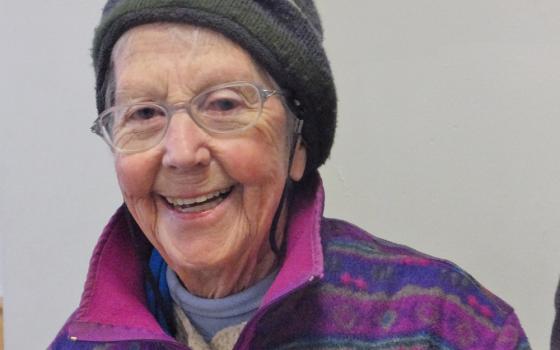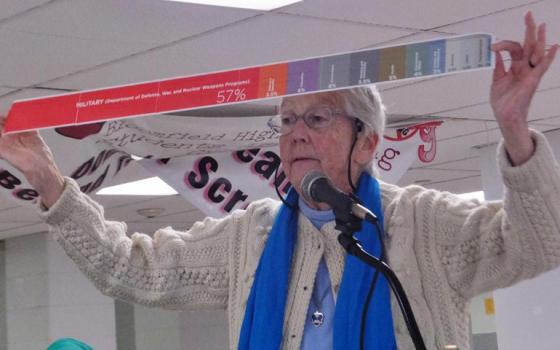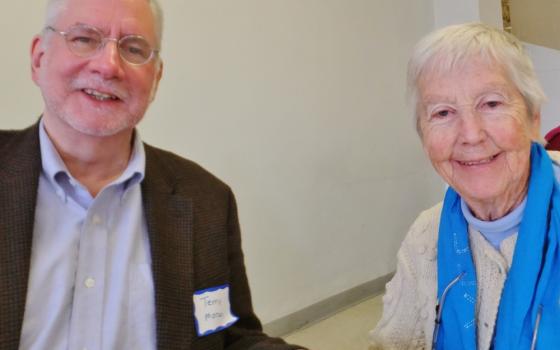If a prize is ever presented for "protestor prodigy," Sr. Megan Rice may well be in the running. The Society of the Holy Child Jesus sister, now 85, has been arrested almost 40 times and has spent some three years in jail in her quest to rid the world of nuclear weapons.
One might think she's been doing this all her life, but most of her activism and subsequent arrests came after she'd spent 33 years teaching science and running schools in Nigeria and Ghana. In the late 1980s and 1990s she returned to the United States twice from Africa to help move and care for her mother, Madeleine Newman Hooke Rice. She even took her along on a few protests while back in the States on leave.
Why has Rice trespassed at the nuclear test site in the Nevada desert? Why has she served two six-month prison terms for protests outside the gates of Ft. Benning, Georgia, with the SOA Watch? Why did she break into the government's premier nuclear storage facility in Oak Ridge, Tennessee?
"Being an anti-nuclear activist satisfied my need to do what is just common sense," Rice told GSR in an extended interview in mid-November, when the nun addressed some 150 members and supporters of New Jersey Peace Action. She challenged them to take on the disarmament task now that she's been released from a three-year jail term after serving two years. She pointed to international laws that ban the development of weapons of mass destruction, repeating "it's just common sense."
Rice does not resemble an aging hippie. She sports short silver hair surrounding a well-wrinkled but ever-smiling face. She keeps both feet on the ground — in comfortable shoes. Her tall, slim bearing and assured gait belie her years. "I've been blessed with good health; I have no children or grandchildren; I'm retired," she said as if to justify this post-missionary diversion. "I can do this."
But then, "so can you," she tells her audience. "We can all do something for peace." Whenever she contemplates a new anti-nuclear action, she considers whether she and her fellow participants are able to serve time if arrested and convicted. Long term, she said she's willing to die in jail for this cause.
Regrets
In 2013 Rice was convicted of misdemeanor trespass and destruction and depredation of government property for breaking into the Y-12 National Security Complex in Oak Ridge. She told the judge: "I regret I didn't do this 70 years ago."
The youngest of the three Rice sisters, Megan was 15 when the United States first used a nuclear weapon on the city of Hiroshima, Japan. She and her sister were in Maine in August 1945 when her mother let them know what she had just read in a New York paper: "A-Bomb Dropped."
"Do you know what my mother told us? She said: 'Thank God, now your Uncle Walter won't have to take part in the invasion of Japan.'"
Instead their mother's brother, who volunteered at the end of World War II, was quickly sent to Nagasaki, site of the second nuclear attack. There he met and drove the Jesuit bishop of Nagasaki, Paul Aijiro Yamaguchi, to the blast area where the bishop had lost family members on Aug. 9, 1945.
Rice said she had been aware since age nine of a government program so secret that the scientist who lived next door to them in Manhattan could not say anything about his work, even to his spouse. The man was "an escapee from either Germany or Austria," she said, who'd been tortured before fleeing Europe and whom Rice's father, Dr. Frederick W. Rice — a New York City physician and academic — suspected was a physicist. Years later Rice learned that the man on Claremont Avenue, a block West of Columbia University, had been a mathematical biologist.
"It took a long time to digest all this," Rice said of the A-bombs, the neighbor's secret job and her uncle's enlistment at age 32. She could never agree with those who said dropping the bomb saved millions of U.S. and Japanese lives. "It's been a complete campaign of misinformation," she said, her voice rising.
"The bomb did not shorten the war. The Japanese were ready to surrender, but were holding out for assurances that the emperor would be treated respectfully, not tried as a war criminal."
After reading articles and books by and about J. Robert Oppenheimer, the father of the A-bomb, Rice said that the scientists who worked on the nuke were told it would not be dropped on a city; it would be detonated over the Pacific. "They all knew it should never be used, but they were lied to," she said. "We were all lied to for over 70 years," she said.
Talk about politics, the continuing war and the resultant refugee crisis of the 1940s was common in Rice's home where her parents were friends and supporters of Dorothy Day and her Catholic Worker Movement.
The couple and their children belonged to Corpus Christi church on the Columbia campus. Rice recalled its pastor Fr. George B. Ford, who was loved by Jews and Protestants for his outreach. Columbia and Barnard College students liked him, too, perhaps as much for the flamboyant cloak he wore to march down Broadway, leading them to a storefront soup kitchen where students sat with the homeless and hungry. "He wanted them to know about poverty and racial ills in the city," she said.
Rice never attended either school, but her mother, a Barnard graduate, was a frequent presence around Columbia as she researched and wrote her doctorate on American Catholic opinion about slavery. Rice said her mother was also "won over" by sisters from the Society of the Holy Child Jesus. Her daughter wanted to work as a missionary in Africa, and these women had opened a mission in Nigeria in 1930.
At age 18 Rice cast her lot with the sisters, visiting them at their motherhouse in suburban Philadelphia.
"I knew they needed teachers in Africa. I never thought I'd be a good teacher," she said, "but I was good in science." Rice went on to do her undergraduate degree at Villanova, transferring to Boston College for her master's in radiation biology. By 1962, she was 32, a trained instructor and off to teach in Nigeria.
Plowshares
In the footsteps of her community's foundress, Cornelia Connelly, Rice found herself living out the society's motto: "action, not words," when she returned from Africa in 2003. After several arrests for civil disobedience, she said she felt called to engage in a Plowshares resistance against nuclear weapons.
Plowshares volunteers — many of them priests like Jesuit Fr. Daniel Berrigan and his late brother, former Josephite Fr. Philip Berrigan — enter places where nuclear arms are manufactured or stored. They hammer on the places where the bombs are built, pour human blood on the area and hang banners protesting the weapons.
Since the group's first disarmament action on Sept. 9, 1980, some 100 volunteers have confronted nuclear arms in a non-violent manner around the world. The Plowshares name is taken from Isaiah's injunction to beat swords into plowshares and study war no more. Most resisters have gone to jail; some like Oblate Fr. Carl Kabat have served almost two decades behind bars. "I can do this," Rice thought.
Retired from teaching, she went to Tacoma, Washington, in 2011 to support the five Disarm Now Plowshares activists. They included Sacred Heart Sr. Anne Montgomery, 84, Jesuits Fr. Bill Bichsel, 82, and Fr. Steve Kelly, 61, Susan Crane, 66 and Lynne Greenwald, 61. (These were their ages at the time.)
On Nov. 2, 2009, the five had entered the Kitsap-Bangor, Washington, nuclear weapons naval base which is home to over 2,000 warheads — about a quarter of the U.S.'s nuclear arsenal. The base is 20 miles from Seattle and is the chief storage area for weapons that are fitted onto the Trident submarines that dock at Bangor. The group wanted to symbolically disarm the weapons and expose the illegality of the government's ongoing preparations for nuclear war, Rice said. They cut fences, hung banners, planted sunflower seeds, prayed and spent some four hours on the base before security personnel seized them.
Eleven months later after the trial and sentencing of the five Disarm Now Plowshares activists, Rice undertook a similar action in Oak Ridge, Tennessee, site of the government's largest stockpile of enriched uranium for bomb-making.
On the night of July 28, 2012, Rice, then 82, joined by Michael Walli, 63, and Greg Boertje-Obed, 56, and made their way up a ridge leading to the Y-12 National Security Complex in Oak Ridge. The complex was deemed to be the most secure in the government's military arsenal as it holds enough enriched uranium to make 10,000 nuclear weapons, Rice said.
Following a slow climb through a heavily wooded area in the dark, the trio cut through barbed-wire fences and crawled through their self-made openings. They then walked to the building containing the nuclear stash, handedly avoiding any security cameras, electronic motion sensors or guards. They spray-painted Biblical quotes and anti-war slogans on the building. They hammered on its walls and tossed a vial of human blood against it. Rice wrapped some pillars with crime-scene tape. They knelt in prayer, waiting several minutes before being apprehended.
All of their actions were meant to symbolize the crime of nuclear weapons, said Rice who noted that the trio did not term their action a "break in," but rather a legal entrance by citizens who are required to expose and oppose known crimes according to their ability and their situation. Rice served two years of a three-year sentence, and her confreres served two years of their five-year sentence.
Earlier this year a federal appeals court vacated the trio's sentences, noting that the government had overreached in charging them with sabotage. Rice said she was sad when she was released May 16 — sad to leave the 110 female prisoners with whom she had lived in a single large room of the Metropolitan Detention Center in Brooklyn. She called her fellow cellmates "the salt of the earth" and said it had been "a grace to live among people who are brave, suffering victims of the state."
Rice spent months planning, discerning and discussing her action with Walli and Boertje-Obed. They called their endeavor Transform Plowshares, because they believe the industry that made the bombs "can unmake them and make something far better," she said. "Let us look to the common good when we look at what's to be done to transform this industry," Rice said, citing $10 trillion spent on design, development and deployment of nuclear arms over seven decades.
Rice encouraged her audience in Bloomfield to work toward the banning of all nuclear weapons, noting that more than 100 nations have already signed the Non-Proliferation Treaty, which calls for their abolition. "If nobody had these weapons, nobody would want them. Nobody would need them."
She urged her NJ Peace Action listeners — an arm of the national grass roots group founded as SANE in 1957 — to learn all they can about the military industrial complex. "Work to transform bomb-making enterprises into industries that enhance rather than destroy life, that advance the common good."
The enthusiastic response that greeted her message seemed to indicate — "Yes, I can do that."
(The organization later became SANE/Freeze and, in 1993, renamed itself Peace Action.)
[Patricia Lefevere has reported for National Catholic Reporter from six continents since 1975. A business and finance reporter in Hong Kong and Brussels, she switched to religion after moving back to the United States following 16 years of living, studying and writing in Europe, Asia and Australia. She lives and writes on the Left Bank of the Hudson in Englewood, New Jersey.]



